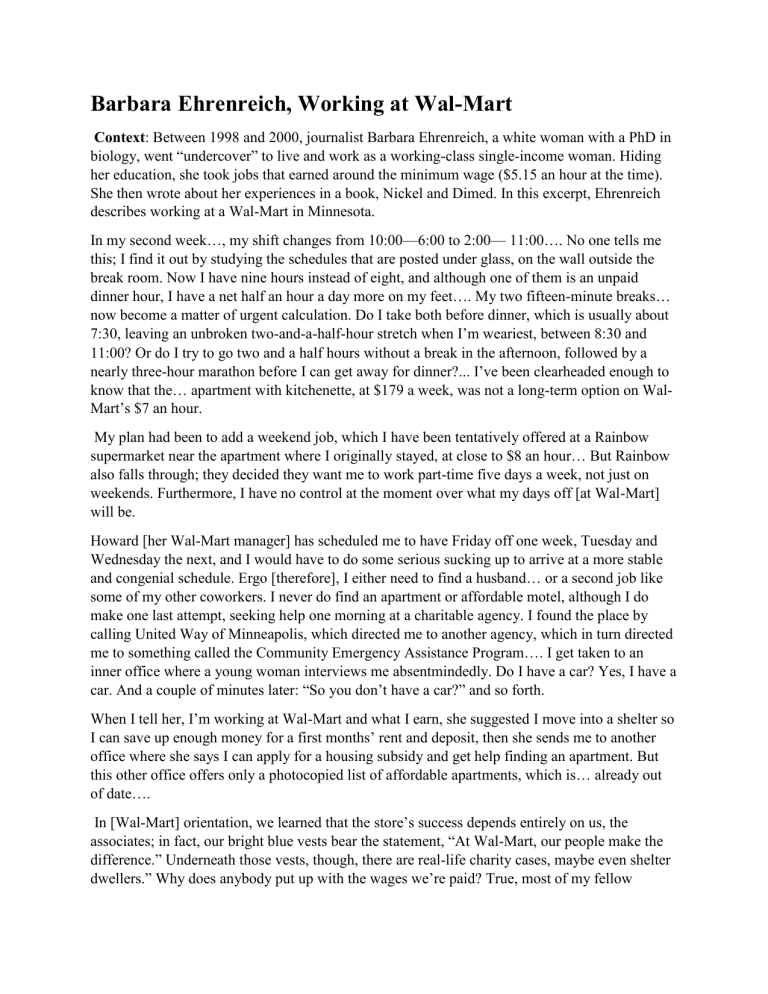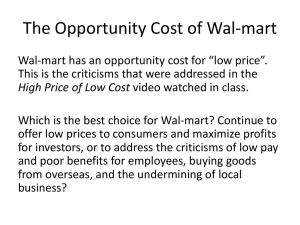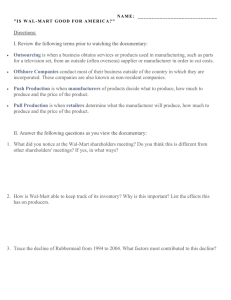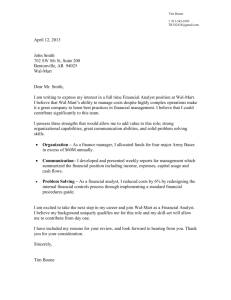
Barbara Ehrenreich, Working at Wal-Mart Context: Between 1998 and 2000, journalist Barbara Ehrenreich, a white woman with a PhD in biology, went “undercover” to live and work as a working-class single-income woman. Hiding her education, she took jobs that earned around the minimum wage ($5.15 an hour at the time). She then wrote about her experiences in a book, Nickel and Dimed. In this excerpt, Ehrenreich describes working at a Wal-Mart in Minnesota. In my second week…, my shift changes from 10:00—6:00 to 2:00— 11:00…. No one tells me this; I find it out by studying the schedules that are posted under glass, on the wall outside the break room. Now I have nine hours instead of eight, and although one of them is an unpaid dinner hour, I have a net half an hour a day more on my feet…. My two fifteen-minute breaks… now become a matter of urgent calculation. Do I take both before dinner, which is usually about 7:30, leaving an unbroken two-and-a-half-hour stretch when I’m weariest, between 8:30 and 11:00? Or do I try to go two and a half hours without a break in the afternoon, followed by a nearly three-hour marathon before I can get away for dinner?... I’ve been clearheaded enough to know that the… apartment with kitchenette, at $179 a week, was not a long-term option on WalMart’s $7 an hour. My plan had been to add a weekend job, which I have been tentatively offered at a Rainbow supermarket near the apartment where I originally stayed, at close to $8 an hour… But Rainbow also falls through; they decided they want me to work part-time five days a week, not just on weekends. Furthermore, I have no control at the moment over what my days off [at Wal-Mart] will be. Howard [her Wal-Mart manager] has scheduled me to have Friday off one week, Tuesday and Wednesday the next, and I would have to do some serious sucking up to arrive at a more stable and congenial schedule. Ergo [therefore], I either need to find a husband… or a second job like some of my other coworkers. I never do find an apartment or affordable motel, although I do make one last attempt, seeking help one morning at a charitable agency. I found the place by calling United Way of Minneapolis, which directed me to another agency, which in turn directed me to something called the Community Emergency Assistance Program…. I get taken to an inner office where a young woman interviews me absentmindedly. Do I have a car? Yes, I have a car. And a couple of minutes later: “So you don’t have a car?” and so forth. When I tell her, I’m working at Wal-Mart and what I earn, she suggested I move into a shelter so I can save up enough money for a first months’ rent and deposit, then she sends me to another office where she says I can apply for a housing subsidy and get help finding an apartment. But this other office offers only a photocopied list of affordable apartments, which is… already out of date…. In [Wal-Mart] orientation, we learned that the store’s success depends entirely on us, the associates; in fact, our bright blue vests bear the statement, “At Wal-Mart, our people make the difference.” Underneath those vests, though, there are real-life charity cases, maybe even shelter dwellers.” Why does anybody put up with the wages we’re paid? True, most of my fellow workers are better cushioned than I am; they live with spouses or grown children or they have other jobs in addition to this one. I sit with Lynne in the break room one night and find out this is only a part-time job for her—six hours a day—with the other eight hours spent at a factory for $9 an hour. Doesn’t she get awfully tired? Nah, it’s what she’s always done. The cook at the Radio Grill [in Wal-Mart] has two other jobs. You might expect a bit of grumbling, some signs here and there of unrest… but I can detect none of that. Maybe this is what you get when you weed out all the rebels with drug tests and personality “surveys.” Melissa, who has the advantage of a working husband, says, “Well, it’s a job.” Yes, she made twice as much when she was a waitress but that place closed down and at her age she’s never going to be at a high-tip place…. Someone has to puncture the prevailing fiction that we’re a “family” here, we “associates” and our “servant leaders,” held together solely by our commitment to the “guests.” After all, you’d need a lot stronger word than dysfunctional to describe a family where a few people get to eat at the table while the rest—the “associates” and all the dark-skinned seamstresses and factory workers worldwide who make the things we sell—lick up the drippings form the floor: psychotic would be closer to the mark. Source: Barbara Ehrenrich, Nickel and Dimed: On (Not) Getting By in America (New York: Holt, 2001), 163, 169-70, 173, 175, 178, 185.



